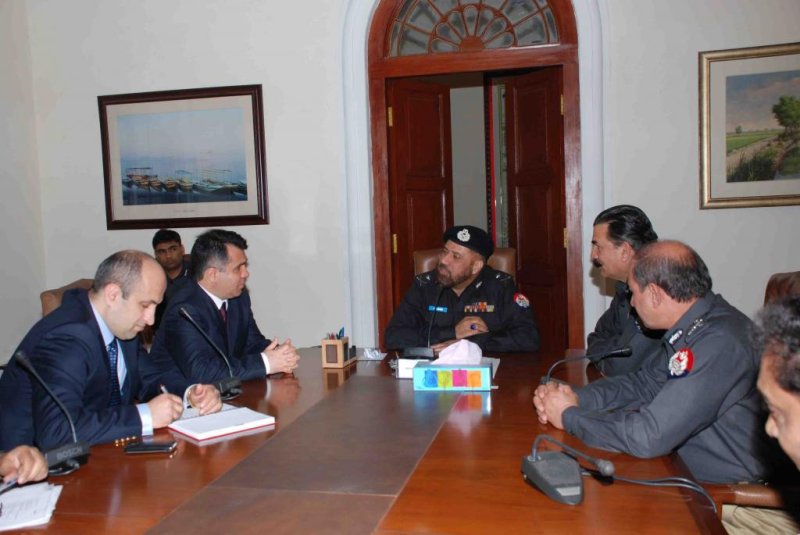1 of 3 | Turkish delegation meeting with Pakistani police officers. UPI Next photo courtesy Punjab Provincial Police website.
LAHORE, Pakistan, March 20 (UPI Next) --
Officers in Punjab's provincial police department, the largest in Pakistan, are seen as woefully under-trained and inefficient, a condition critics inside and outside the department attribute to a lack of funds and instruction, although outside help may be on the way.
There are only eight training facilities for about 200,000 police officers, and their curriculum is outdated and insufficient, current and former provincial officials say. Police do not keep up with basic paperwork, and cannot write up cases or conduct basic law enforcement functions, they contend.
Shaukat Javed, a former Punjab police inspector general, told UPI Next police training, unchanged since the 1940s, emphasizes parade sessions, colorful uniforms and weapons practice without focusing on the intellectual aspects of the law enforcement work required in Punjab province, whose 101 million residents comprise more than half of Pakistan’s population.
Instead, he said, police should be able to detect and solve crimes, enforce laws and work with national authorities on counter-terrorism.
"The pre-Partition British model of policing and training still exists and it is, of course, not appropriate to combat today's crimes -- especially terrorism," Javed said, referring to the 1947 partition of British India that created Pakistan.
"Traditional methods must be replaced with modern techniques and approaches because criminal methods are also changing with the passage of time.”
Eighteen months ago, the department contracted a Turkish company to help train its officers, a program that has not yet begun. The curriculum would emphasize basic police work, from filing useful arrest reports to law enforcement.
Punjab's government has earmarked $37 million to $50 million for overall training, out of a 2013-2014 budget of $730 million. The Turkish program fee will come out of that fund.
Iltaf Bajwa, a senior lawyer in Lahore, says ordinary police officers receive no legal training and are not taught how to file incident reports.
"Policemen don't even have the sense to write descriptions of cases. They are not sufficiently trained to interrogate suspects or to record witness interviews that could either put innocents behind bars or set them free," Bajwa told UPI Next.
"Joint training sessions of police, prosecutors and judges must be organized to understand one another's problems and to create a healthy system.”
Tariq Chuhan, a senior provincial police official, says comprehensive planning is under way to separate elite forces units from the policing section.
"Furthermore,” he told UPI Next, “the department will also have to focus on [developing a] separate investigation force trained by forensic lab experts."
Chuhan also says the police force needs to be trained to collect intelligence, engage in preventive and proactive law enforcement measures, the handling of crime scenes on scientific grounds and to react to crimes more quickly.
Police Inspector Muhammad Abid says the quality of policing in the province also would improve if officers’ workloads were reduced and there was less political interference.
Ahmed Mobarak, a general police deputy inspector and principal of Chung Police Training College, says the 2,000-3,000 recruits who comprise each training class are more than the institute can handle. The result, he says, is trainees receive only a small fraction of the law enforcement schooling they need.
"Moreover, they don't have enough practical opportunities to deal with crime scenes according to the scientific approaches," Mobarak said.
Raja Basharat, a former provincial law minister, tells UPI Next that elite force training is far better than the common police force training techniques. However, he says while the elite force recruits are trained to face virtually all crime situations, they are often deployed escorting dignitaries. Basharat says the elite forces should either be in the field combating crime and terrorism or regular police officers should receive the same level of training.
Basharat also recommends separating duties so that investigating officers can concentrate on their responsibilities.
“The investigation department must have a separate staff to enhance effectiveness of law [enforcement]," he suggested.
Rana Sana Ullah, minister of law for Punjab province, says Chief Minister Shahbaz Sharif has approved the training of 30,000 troops with modern techniques to combat terrorism and serious crimes.
"This is the concept of separating combating units from the normal police force,” Ullah told UPI Next. “The chief minister has also released $2.38 million to establish an integrated command and control system to train these troops.
“Furthermore, police stations will be computerized for the first time in a couple of years. The government is also working to improve the intelligence system and to hire specialized staff for our training schools. Moreover, we are also waiting for the recommendations of the committee which is working to improve policing with the help of Turkish officers."
Sarmad Saeed Khan, a police inspector general, points out there is no separation of administrative and operational responsibilities, with officers performing multiple roles.
"Our system does not have the concept of specialized investigation, interrogation, handling of crime scenes, preventive policing and tracing or reactive methods,” he told UPI Next. “The concept of separate combating units is also missing.”





